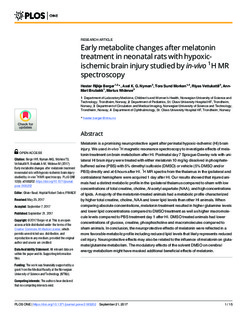Early metabolite changes after melatonin treatment in neonatal rats with hypoxic-ischemic brain injury studied by in-vivo 1H MR spectroscopy
Berger, Hester Rijkje; Nyman, Axel Karl Gottfrid; Morken, Tora Sund; Vettukattil, Muhammad Riyas; Brubakk, Ann-Mari; Widerøe, Marius
Journal article, Peer reviewed
Published version

View/
Date
2017Metadata
Show full item recordCollections
Abstract
Melatonin is a promising neuroprotective agent after perinatal hypoxic-ischemic (HI) brain injury. We used in-vivo 1H magnetic resonance spectroscopy to investigate effects of melatonin treatment on brain metabolism after HI. Postnatal day 7 Sprague-Dawley rats with unilateral HI brain injury were treated with either melatonin 10 mg/kg dissolved in phosphate-buffered saline (PBS) with 5% dimethyl sulfoxide (DMSO) or vehicle (5% DMSO and/or PBS) directly and at 6 hours after HI. 1H MR spectra from the thalamus in the ipsilateral and contralateral hemisphere were acquired 1 day after HI. Our results showed that injured animals had a distinct metabolic profile in the ipsilateral thalamus compared to sham with low concentrations of total creatine, choline, N-acetyl aspartate (NAA), and high concentrations of lipids. A majority of the melatonin-treated animals had a metabolic profile characterized by higher total creatine, choline, NAA and lower lipid levels than other HI animals. When comparing absolute concentrations, melatonin treatment resulted in higher glutamine levels and lower lipid concentrations compared to DMSO treatment as well as higher macromolecule levels compared to PBS treatment day 1 after HI. DMSO treated animals had lower concentrations of glucose, creatine, phosphocholine and macromolecules compared to sham animals. In conclusion, the neuroprotective effects of melatonin were reflected in a more favorable metabolic profile including reduced lipid levels that likely represents reduced cell injury. Neuroprotective effects may also be related to the influence of melatonin on glutamate/glutamine metabolism. The modulatory effects of the solvent DMSO on cerebral energy metabolism might have masked additional beneficial effects of melatonin.
